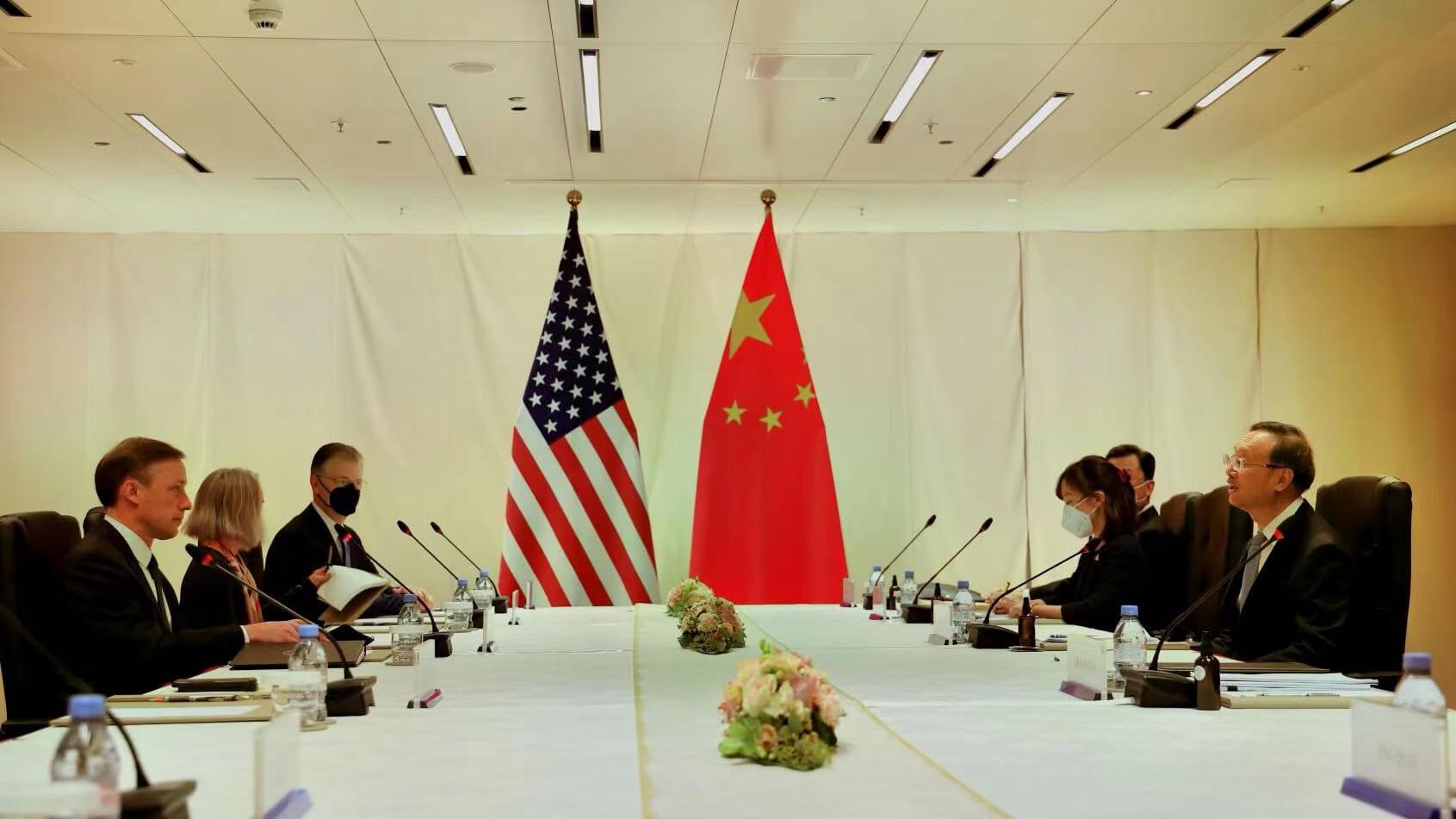On Monday, White House National Security Adviser (NSA) Jake Sullivan conducted an “intense” meeting with his Chinese counterpart Yang Jiechi in Rome, Italy. In a follow-up to the Presidential meeting between Joe Biden and Xi Jinping that took place last November, the two senior officials addressed a range of issues concerning the United States (US) and China, including and Russia’s invasion of Ukraine, shared concerns over Taiwan, and the escalating situation in North Korea.
Playing the “Taiwan card” is like playing with fire. It will not only push Taiwan to a precarious situation, but also bring unbearable consequences for the US. pic.twitter.com/lN0R9Mk4vI
— Spokesperson发言人办公室 (@MFA_China) March 14, 2022
A senior Biden administration official called the seven-hour-long meeting “candid,” adding that although the meeting took place under extraordinary circumstances prompted by Russia’s war in Ukraine, the meeting was in the works for a long time.
According to Newsweek, Taiwan featured prominently at the Monday meeting, with Washington emphasising on its commitment to the ‘One China’ policy while also highlighting its obligation towards Taiwan based on the three China-US joint communiqués: Taiwan Relations Act, Three Communiqués, and, Six Assurances.
Under the terms of the Taiwan Relations Act, which forms the basis for Washington’s relationship with Taipei, the US is required to provide the island with the means to defend itself. However, in recent months, China has been increasing its incursions into Taiwan’s maritime territory and airspace via serious shows of intimidation.
The disinformation spread by the United States to smear China is neither responsible nor ethical. pic.twitter.com/VRIxqRafNa
— Spokesperson发言人办公室 (@MFA_China) March 14, 2022
Keeping this in mind, Sullivan expressed concern over China’s “provocative” actions in the Taiwan Strait.
A media readout provided by China’s embassy in the US called for respect for the principle of non-interference, stating, “Yang Jiechi stressed that the Taiwan issue concerns China’s sovereignty and territorial integrity.”
Likewise, a release by the Chinese Ministry of Foreign Affairs stressed that “mutual, respect, peaceful coexistence, and win-win cooperation” could only be achieved if the US does not support “Taiwan independence” or have any “intention to have a conflict with China.” Yang stressed that the ‘One China’ principle is the “prerequisite” for healthy bilateral ties and said that the US’ recent actions are “not consistent” with previous agreements it has signed on the matter He made similar warnings about interference in China’s internal affairs with regards to the topics of Xinjiang, Tibet, and Hong Kong.
#China's top diplomat #YangJiechi met w/ #US Nat'l Security Advisor #Sullivan in Rome, saying China &the US should strengthen dialogue &cooperation, properly manage differences &prevent conflict &confrontation, which serves the interests of the 2 people &people across the world. pic.twitter.com/yGZt4b4es0
— Ambassador Deng Xijun (@China2ASEAN) March 15, 2022
Separately, Chinese Foreign Ministry spokesperson Zhao Lijian told reporters that Taiwan is an “inalienable” part of Chinese territory, calling the US’ involvement a gross interference into China’s internal issues.
Zhao also criticised a recent US-Taiwan arms deal worth $250 million, calling it a major violation of the three China-US joint communiqués. He warned that Washington’s continued support for the independence movement of Taiwan could have major implications for regional security and US-China relations.
In recent years, Taiwan has been a major point of contention between the US and China. Last December, Chinese Foreign Minister Wang Yi issued a stern warning to the US, saying it will face an “unbearable price” if it continued to support Taiwan’s independence. Both China and the US have slammed one other for conducting military activity in the Taiwan Strait and jeopardising regional stability.
Senior #US official on talks w/#China in Rome:
— Joseph Haboush (@jhaboush) March 14, 2022
• "Intense, seven-hour session reflecting the gravity of the moment"
• Extensive conversation on #Russia-Ukraine
• Discussed North Korea
• Reiterated One China Policy
• "Deep concerns" about China's alignment w/Russia
Sullivan also touched on his “deep concerns about China’s alignment with Russia” during the Monday meeting, adding that Washington has conveyed these concerns to Beijing via private and public communication channels. Prior to the meeting, Sullivan had warned China against providing Russia with military and economic support, following reports that Moscow has asked Beijing for assistance.
Meanwhile, Chinese state-run media outlet Global Times called the meeting an attempt to pressure China into joining Western sanctions against Russia. The publication said Beijing slammed Washington’s efforts to coerce other countries into following its agenda against Moscow.
China has been criticised by the West for siding with Russia over the ongoing war in Ukraine. Prior to Russia’s invasion, China supported Russia’s concerns, saying they should be “taken seriously and addressed” and also took aim at the involvement of NATO and the US. Following, Russia’s invasion, Beijing has emphasised on diplomacy and dialogue and has even offered humanitarian assistance to Ukraine, but has refused to criticise Russia, which it continues to refer to as its “most important strategic partner.”
There are disconcerting Western intelligence reports, however, that suggest that Chinese officials had prior knowledge of Russia’s intentions and war plans. A report cited by the New York Times states that Chinese officials had in early February urged their Russian counterparts to delay the invasion of Ukraine until after the completion of the Beijing Winter Olympics.
Sullivan also clearly relayed Washington’s “serious concerns” regarding North Korea’s recent escalatory moves. He stressed that Washington wants to collaborate with Beijing to push the nuclear-armed Pyongyang “on a different path,” citing the US-China history of collaboration on this issue as a positive indication, adding that the US will also work closely with its allies in the region, Japan and South Korea. The delicate nature of the conflict is particularly significant considering the imminent entry into office of South Korean President-elect Yoon Suk-Yeol, who has previously expressed his intention to launch preemptive strikes on the North if it displays an intent to attack.

